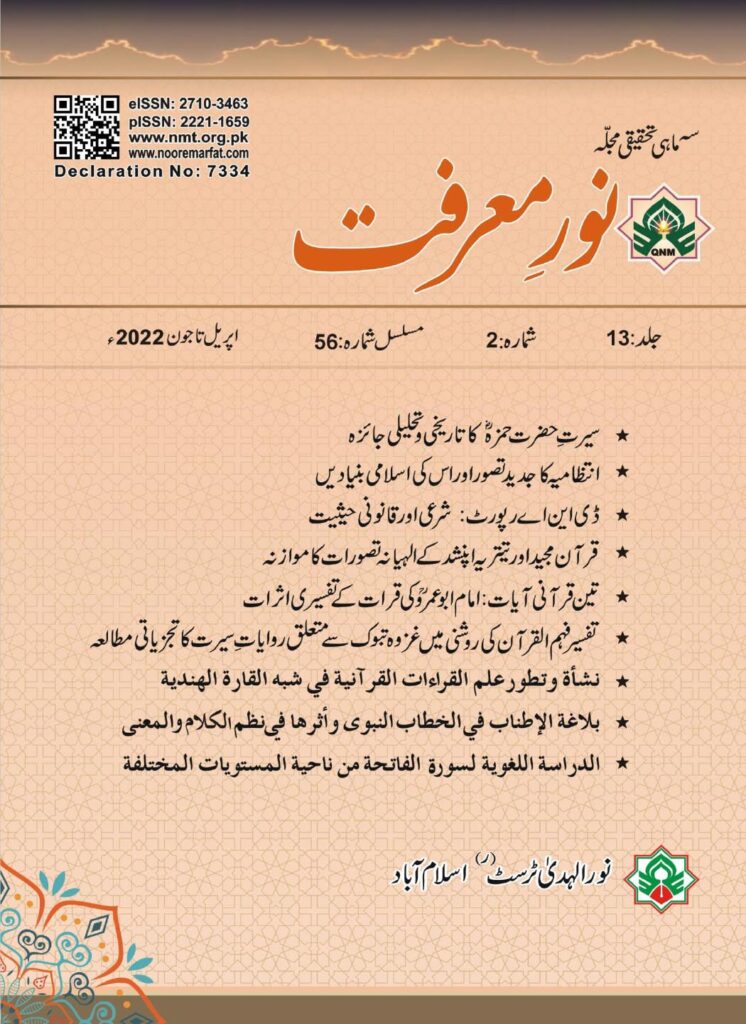- Qari Abdul Nasir
The University of Faisalabad
Abstract
Imam Abu Amr al-Basri is counted among the ten consecutive recitations and he is the only one who has the consensus of the scholars to be a pure Arabic. He was a just, trustworthy and an ascetic man who was devoted to spend his wealth for good deeds. He was well versed in sciences such as recitation, dictionary, history, genealogy and poetry. His recitation is easy, heartwarming and beyond difficulty. He was the most knowledgeable of the Qur’an and Arabic lexicon among his contemporary scholars and famous readers. However, in some verses there is a difference between his recitation and the recitation of other reciters.
While providing a brief introduction of Imam Abu Amr, this article interprets the literal and terminological meaning of reciting the Qur’an. Keeping in mind the famous recitation of seven reciters and especially the recitation of Imam Abu Amr, it then discusses three verses of the Holy Qur’an. Two of these verses are related to Qur’anic verbs (افعال) and the third verse is related to Qur’anic plural noun (اسم جمع). These verses are generally disputed by the commentators.
In order to easily understand the interpretive effects of the difference of recitation in the selected verses, four different steps have been taken in the light of the sayings of reliable commentators:
- After translating the related verse, the difference of the ten reciters is mentioned.
- The meanings and concepts of recitations is explained in different Qur’anic words.
- The interpretive effects caused by the differences of recitations is resolved.
- At the end of each verse, a brief but comprehensive analysis is presented so that the scholars, those who have a taste for the knowledge of recitations, and especially the readers can understand the interpretive effects of the desired verses at any stage. There was no difficulty in explaining, reading and teaching.
References
Muhammad bin Muhammad, Ibn ul Jazri, Ghayatul Nihayah fi Tabqat al Qurra, Vol. 1 (Bairut, Maktabah Ibn-e-Taymiyyah, 1351 SH), 292.
محمد بن محمد ، ابن الجزری، غایۃ النہایۃ فی طبقاتِ القراءِ، ج1 (بیروت، مکتبۃ ابن تیمیۃ، 1351ھ)، 292 ۔
Shamsul Din, Ibn ul Jazri, Al Nashar fi al Qiraat-e-Ashar, Vol. 1 (Bairut, Al Tajariyah ul kubrah,Tasveer Dar ul Kutub al Ilmiyah, 1380 SH), 109.
محمد بن محمد، ابن الجزری، النشر فی القراءات العشر، ج1(بیروت، التجاریۃ الکبریٰ،تصویر دارا لکتب العلمیہ، 1380ھ)، 109۔
Abu al Hasan Ahmad, Ibn ul Fars, Muajam Mqais al Lugat, Vol. 5 (Bairut, Dar al Fikr, 1399 SH), 78.
ابو الحسن احمد، ابن ُالفارس،معجم مقایس اللغۃ،ج5(بیروت، دارالفکر، 1399ھ)، 78 ۔
Husain al Ragib,al Asfahani, Mufradat fi Ghareeb al Quran, Vol. 2 (Bairut, Dar al Qalam, 1412 AH), 238.
حسین الراغب، الاصفہانی، المفردات فی غریب القرآن، ج2 (بیروت، دارالقلم، 1412ھ)، 238 ۔
Muhammad bin Yaaqoob, Feroozabadi, Al Qamous al Muheet, Vol. 1 (Bairut, Muaasisah al Risalah, 1426 AH), 62.
محمد بن یعقوب، فیروزآبادی، القاموس المحیط، ج1 (بیروت، مؤسسۃ الرسالۃ، 1426ھ)، 62 ۔
Jalal ul Din, Al Suyuti, Al Itqan fi Uloom al Quran, Vol. 1 (Bairut, Al Hayhatul al Misriah lil Kitab, 1414 AH), 52;
جلال الدین، السیوطی، الاتقان فی علوم القرآن، ج1(بیروت، الہیئۃ المصریۃالعامۃ للکتاب، 1414ھ)، 52 ۔
Muhammad Abdul Aazeem, Al Zarqani, Manahil al Irfan fi Uloom al Quran, Vol. 1 (Misr, Matbah Isa al Halbi wa Shurakah, 1390 SH), 7.
محمد عبدالعظیم،الزرقانی، مناہل العرفان فی علوم القرآن،ج1(قاہرہ،مطبعۃ عیسیٰ البابی الحلبی وشرکاہ،1390ھ)،7۔
Shahabul Din, Al Asqalani, Lataiful Isharat Lifnoon al Qiraat, Vol. 1 (Riaz, Majmaa al Malik Fahd, 1434 AH), 170.
شہاب الدین، العسقلانی، لطائف الاشارات لفنون القراءات، ج1 (ریاض، مجمع الملك فہد، 1434ھ)، 170 ۔
Abdul Fattah,al Al-Qazi, Al Budoorul Zahirah fi al Qiraat al Ashar al Mutawatirah (Bairut, Darul Kutub al Arabiyah, 1413 AH), 51.
عبدالفتاح،القاضی،البدورالزاہرۃ فی القراءات العشرۃ المتواترۃ(بیروت،دارالکتب العربی،1413ھ)،51۔
Sayed Abul Aala , Mawdodi, Tarjimah Quran-Majeed (Lahore, Idarah Tarjimanul Quran, 2014), 341.
سید ابوالاعلیٰ ،مودودی، ترجمہ قرآنِ مجید (لاہور، ادارہ ترجمان القرآن، 2014ء)، 341 ۔
Muhammad bin Hassan, Abu Jafar, Alshaykh Altuwsi, Altibyan fay Tafasyr alquran, Vol # 4, (Muktab Alaelam alislamiy, biyrut, 1409 AH),108.
محمد بن حسن، ابو جعفر، الشيخ الطوسي، التبيان فی تفسیر القرآن، ج 4 )مکتب الاعلام الاسلامی، بیروت، 1409 ھ(، -108
Husain bin Ahmad, Ibn Khalwaih, Al Hujjah fi al Qiraat-e-Saba (Bairut, Darul Shurooq, 1401 AH), 137.
حسین بن احمد، ابن خالویہ، الحجۃ فی القراءات السبع (بیروت، دارالشروق، 1401ھ)، 137 ۔
Jamalul Din, Ibnul Jawzi, Zadul Maseer fi Ilm-e-Tafseer, Vol. 2 (Bairut, Darul Kitab-e-al Arabiyah, 1422 AH), 20.
جمال الدین ، ابن الجوزی، زادالمسیرفی علم التفسیر، ج2 (بیروت، دارالکتاب العربی، 1422ھ)، 20۔
Muhammad bin Ali, Al Shawkani, Tafseer-e-Fathul Qadeer, Vol۔ 2 (Damishq, Dar-e-Ibn Kaseer, 1414 AH), 123.
محمدبن علی، الشوکانی،تفسیر فتح الدیر ، ج2(دمشق،دارابن کثیر،1414ھ)،123۔
Husain bin Ahmad, Ibn Khalwaih, Al Hujjah fi al Qiraat-e-Saba (Bairut, Darul Shurooq, 1401 AH), 141.
حسین بن احمد، ابن خالویہ، الحجۃ فی القراءات السبع (بیروت، دارالشروق، 1401ھ)، 141 ۔
Muhammad bin Ahmad, Al Qurtubi, Al Jamia Liahkam-e-Quran, Vol. 7 (Al-Qahirah, Darul Kutub-e-Misriyah, 1384 SH), 8.
محمدبن احمد، القرطبی، الجامع لاحکام القرآن، ج7 (القاہرۃ، دارالکتب المصریۃ، 1384ھ)، 8۔
Jamalul Din, Ibnul Jawzi, Zadul Maseer fi Ilm-e-Tafseer, Vol. 2 (Bairut, Darul Kitab-e-al Arabiyah, 1422 AH), 39.
جمال الدین ، ابن الجوزی، زادالمسیرفی علم التفسیر ، ج2(بیروت، دارالکتاب العربی، 1422ھ)، 39۔
